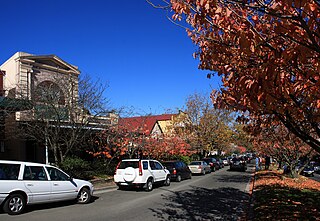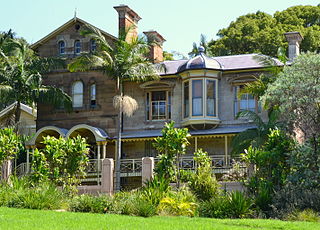
The Jamison Valley forms part of the Coxs River canyon system in the Blue Mountains of New South Wales, Australia. It is situated approximately 100 kilometres west of Sydney, capital of New South Wales, and a few kilometres south of Katoomba, the main town in the Blue Mountains.

Leura is a suburb in the City of Blue Mountains local government area that is located 100 kilometres (62 mi) west of the Sydney central business district in New South Wales, Australia. It is one of the series of small towns stretched along the Main Western railway line and Great Western Highway that bisects the Blue Mountains National Park. Leura is situated adjacent to Katoomba, the largest centre in the upper mountains, and the two towns merge along Leura's western edge.

The Harry and Penelope Seidler House is a heritage-listed modernist house located at 13 Kalang Avenue in the Sydney suburb of Killara in the Ku-ring-gai Council local government area of New South Wales, Australia. It was designed by architects Penelope and Harry Seidler and Harry Seidler & Associates, and built from 1966 to 1967 by Peter Cussel. It was added to the New South Wales State Heritage Register on 20 June 2008.
Elizabeth Andreas Evatt, an eminent Australian reformist lawyer and jurist who sat on numerous national and international tribunals and commissions, was the first Chief Justice of the Family Court of Australia, the first female judge of an Australian federal court, and the first Australian to be elected to the United Nations Human Rights Committee.

Werris Creek railway station is a heritage-listed railway station located at the junction of the Main Northern, Mungindi and Binnaway–Werris Creek lines (Keilbahnhof) in Werris Creek of New South Wales, Australia. The station serves the town of Werris Creek and was built between 1877 and 1880. The station is also known as Werris Creek Railway Station, yard group and movable relics. The property was added to the New South Wales State Heritage Register on 2 April 1999.

Old Government House is a heritage-listed former "country" residence used by ten early Governors of the then-Colony of New South Wales, between 1800 and 1847, and which is located in Parramatta Park in Parramatta, in the suburbs of Western Sydney, New South Wales, Australia. It is considered a site of national and international significance as an archaeological and historical resource. It also serves to demonstrate how the 18th-century British Empire conducted its expansion, and how Australian society has evolved since its establishment in 1788.
Clive Raleigh Evatt was an Australian politician, barrister and raconteur. He was a member of the New South Wales Legislative Assembly from 1939 until 1959. At various times he sat as a member of the Industrial Labor Party, Labor Party and as an independent.

Rona is a historic house in the Sydney suburb of Bellevue Hill, New South Wales, Australia. The house is listed on the Australian Register of the National Estate and is listed on the Municipality of Woollahra local government heritage list. The house is situated in the northern end of the suburb and sold for A$58 million in 2018, making it one of Australia's most expensive homes at the time.
Harry Andreas was an Australian businessman and company director. As a big-game fisherman he pioneered the sport in New Zealand. He was the inventor of the Andreas Fortuna Game Fish Reel and is described in the 1935 edition of Who's Who in Australia as being of "Independent Means".

Penelope Alice Marjorie Seidler AM is an Australian architect and accountant. She is director of the Sydney-based architectural firm Harry Seidler and Associates. She was the wife and professional partner of architect Harry Seidler (1923–2006). Together they designed "Harry & Penelope Seidler House", which won the Wilkinson Award in 1967.

Glenalvon House is a heritage-listed homestead located at 8 Lithgow Street, Campbelltown in the City of Campbelltown local government area of New South Wales, Australia. It was designed and built in 1841 by Michael Byrne. It is also known as Glenalvon and Glenalvon and Stables. The property is owned by Department of Planning and Infrastructure, an agency of the Government of New South Wales. It was added to the New South Wales State Heritage Register on 2 April 1999.

The Justice and Police Museum is a heritage-listed former water police station, offices and courthouse and now justice and police museum located at 4-8 Phillip Street on the corner of Albert Street, in the Sydney central business district in the City of Sydney local government area of New South Wales, Australia. It was designed by Edmund Blacket, Alexander Dawson and James Barnet and built from 1854 to 1886. It is also known as Police Station & Law Courts (former) and Traffic Court. The property is owned by the Department of Justice, a department of the Government of New South Wales. It was added to the New South Wales State Heritage Register on 2 April 1999.
Leura is a heritage-listed former residence and school boarding house and now residence at 24 Victoria Road, Bellevue Hill, New South Wales, Australia. It was designed by Walter Liberty Vernon and Howard Joseland, and built during 1891. It is also known as Street House. It was added to the New South Wales State Heritage Register on 2 April 1999.

The Dalkeith Property or simply Dalkeith, is a heritage-listed residence at 8 Bannerman Street, Cremorne, New South Wales, a suburb of Sydney, Australia. It was designed by Henry Austin Wilshire and Stone & Siddeley, and built between 1908 to 1910. At various points during its history, Dalkeith has been used as a meditation centre, residence and Norwegian Seamen's Church. It was added to the New South Wales State Heritage Register on 2 April 1999.

Evatt House is a heritage-listed house located at 69 Junction Road in the Sydney suburb of Wahroonga in the Ku-ring-gai Council local government area of New South Wales, Australia. It is also known as Parklands. The property is privately owned. It was added to the New South Wales State Heritage Register on 24 September 2004.

Woodford Academy is a heritage-listed former academy school, inn, private residence and boarding house and now a museum, and tourist attraction at 90-92 Great Western Highway, Woodford in the City of Blue Mountains local government area of New South Wales, Australia. It was built from 1828 to 1835 by Thomas Michael Pembroke. It is also known as Woodman's Inn, King's Arms Inn, Buss's Inn, Woodford House and Woodford Academy. The property is owned by the National Trust of Australia (NSW). It was added to the New South Wales State Heritage Register on 1 March 2002.

Everglades is a heritage-listed former residence, art gallery, cafe and garden and now tourist destination, house museum and garden at 37 - 49 Everglades Avenue, Leura, City of Blue Mountains, New South Wales, Australia. The garden was designed by Paul Sorensen and the design of the house is also attributed to Paul Sorensen; and built from 1915 to 1938 by Ted Cohen. It is also known as Everglades Gardens. The property is owned by the National Trust of Australia (NSW). It was added to the New South Wales State Heritage Register on 1 March 2002.

Ewenton is a heritage-listed residence at 1 Blake Street, Balmain, Inner West Council, Sydney, New South Wales, Australia. It was designed by James McDonald and built from 1854 to 1872. It is also known as Blake Vale. It was added to the New South Wales State Heritage Register on 2 April 1999.
Paul Edwin Bielenberg Sorensen was a Danish-born Australian landscape gardener and nurseryman. After leaving Europe due to the outbreak of the First World War, Sorensen lived in Australia for the rest of his life, mostly in the Blue Mountains. He designed and planted over 100 gardens, of which the best known is "Everglades", in Leura, Australia.















